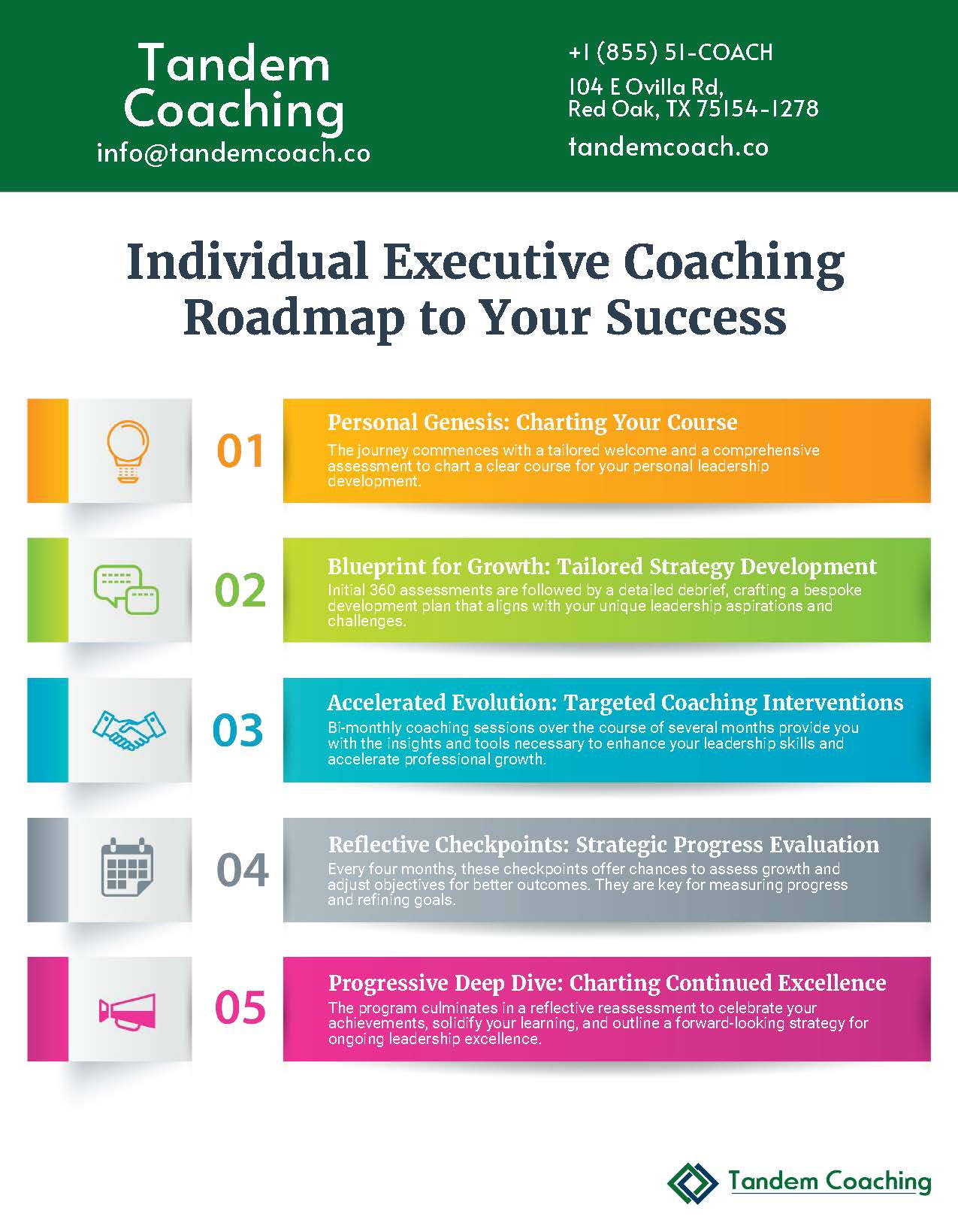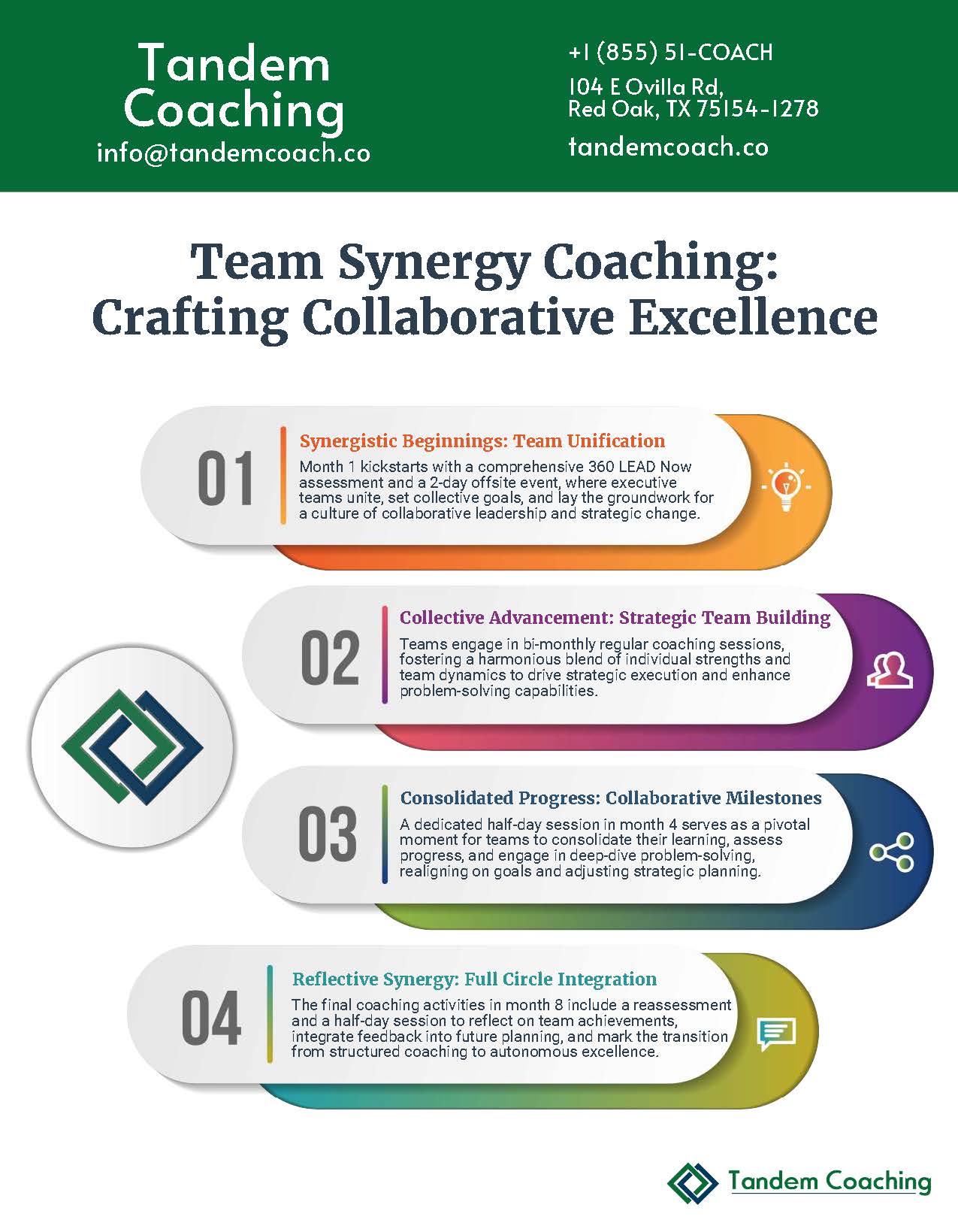Did you know research by The Manchester Review found that Fortune 500 companies investing in executive coaching saw an average return on investment of $100,000 or 5.7 times the initial investment?
Sometimes, the benefits of personal development can be less tangible, such as improved communication abilities or enhanced self-awareness and leadership skills. However, that statistic shows a more quantitative advantage.
Working with an executive coach can offer both quantitative and qualitative improvements, making it a holistic approach to professional development.
In this article, we’ll explore the key benefits of working with an executive coach for C-suite leaders. We’ll define what executive coaching is and explain how coaching will help accelerate your career growth.
TL;DR – 5 Key Benefits to Expect from Executive Coaching Services
At this point, you may be wondering if executive coaching is worthwhile.
The answer is yes; there are numerous benefits to engaging in executive coaching if you’re looking to take your skills to the next level.
If you don’t have time to read the whole piece, here are our top five benefits of executive coaching—we’ll cover these in more detail shortly.
- Manage change
- Introduce new perspectives
- Provide conduits for constructive feedback
- Improve performance
- Develop leaders and thought leadership
The right coach can make a significant difference, ensuring that you leverage all possible benefits effectively. Get in touch today to find out how we can improve your approaches.
It all sounds super interesting, right?! But before we dive deeper into why executive coaching is essential, let’s further define the subject. Certification isn’t required to benefit from executive coaching; what matters is the effectiveness of the coaching relationship.

What is Executive Coaching and How Does the Executive Coaching Process Work?
Executive Coaching is a collaboration and partnership between you and an experienced coach to improve your leadership abilities and enhance organizational impact. Working with a coach from a coaching provider like Tandem Coaching ensures that you are receiving high-quality service tailored to your needs.
Executive coaching from Tandem Coaching is targeted at the C-suite and executive leadership levels. It helps you sharpen your professional qualities and drive real improvements in your industry as a business leader. Executive coaching sessions are designed to align your personal and organizational goals for maximum impact.
These skills can cover a range of areas depending on your specific requirements:
- Motivational skills
- Supportiveness
- Self-Awareness
- Stakeholder engagement
- Strategic thinking
- Leadership skills
- Ability to inspire growth
- Cultural awareness
- Decision-making skills
- Enhance self-confidence
- Develop agile leadership abilities
Key outcomes range from corporate wins, such as improved productivity, to more personal goals, like achieving a better work-life balance.
Want to dive into specifics? Visit our guide: What is an Executive Coach? to better understand how coaching will help you. And remember that good coaches help you navigate through challenging situations, providing the confidential space for leaders to grow and reflect.
Understanding Leadership Development Coaching and Enhancing Leadership Skills
While executive coaching covers many areas an executive may want to develop, executive coaching focuses more on a holistic approach, whereas leadership development coaching has a more targeted focus. This dual focus ensures that coaching doesn’t just stop at surface-level improvements but delves deep into core leadership competencies.
Leadership development coaching helps executives identify specific leadership skills they want to improve, such as influencing, motivating, and inspiring their teams.
The coach then partners with the executive to create an action plan for making positive changes in those targeted areas.
Support like this can help leaders and executives address challenges in a more balanced way. It equips them with coaching skills that are vital for effective leadership. Additionally, it can empower them to become more agile and help the business navigate changing corporate landscapes.
What to Expect From Executive Coaching Process
An executive coach collaborates with you and other senior leadership professionals to identify your strengths, challenges, and areas of opportunity. This involves various team meetings to ensure that all stakeholders are aligned.
Part of this process is defining your business goals and highlighting potential blind spots to help you create a structured roadmap for success.
However, a good approach to getting the most out of coaching at this level is to have ideas about where you would like to see the biggest improvements in yourself through self-reflection. Whether that’s enhancing strategic thinking or sharpening organizational skills to protect your work-life balance. Coaches, among other things, help leaders in leadership roles set clear objectives and develop action plans to achieve them.
Our bespoke executive coaching program uses this approach to ensure we understand your business and personal goals before developing an action plan.
How a Coaching Culture Enhances Leadership Skills and Organizational Improvement
One major benefit of executive coaching is it often motivates leaders to establish a broader coaching culture as a part of their coaching experience. Such a culture aids in developing leadership positions within the organization and ensures a pipeline of top talent.
A strong coaching culture emphasizes ongoing feedback to refine approaches through group conversations, 1-2-1 settings, or more anonymous routes like surveys. At its core, it is a commitment to developing an environment where employees feel safe sharing ideas. This commitment often involves working closely with your executive team to ensure alignment and buy-in.
However, this cultural shift does not happen quickly or easily. In a 2014 study by the Human Capital Institute and the International Coach Federation, only 13% of companies were found to have strong coaching cultures in place.
It requires dedicated buy-in from leadership over an extended period. Yet the benefits are clear. The top advantage is increased productivity and employee engagement.
Research shows that engaged workers have lower absenteeism, less turnover, and higher productivity. Unfortunately, most employees are not actively engaged currently.
A Deloitte study found that:
- 87% of organizations struggle with culture and engagement issues, and
- 50% see low engagement as a very important concern.
After executives experience coaching firsthand and see improvements in their own performance, they better understand the value of developmental support at all levels.
They become more likely to champion company-wide coaching initiatives, which aim to establish a culture of open communication, ongoing feedback, and continuous learning. A good coach will hold you accountable for these initiatives, ensuring long-term success.
Recent studies show companies with mature coaching cultures see over 130% increase in overall performance. The investment pays dividends in trust, communication, and engagement.

Executive Coaching vs Executive Education – What Are the Key Differences?
Executive coaching and executive education are two distinct yet complementary approaches to professional development for leaders. While both aim to enhance leadership skills and organizational performance, they do so through different methodologies and focuses.
Executive coaching is a personalized, one-on-one process where a coach works directly with an executive to address specific challenges, refine leadership skills, and develop strategies tailored to the individual’s needs and organizational context. This coaching process is highly adaptive, allowing for real-time feedback and immediate application of new skills in the workplace.
The primary advantage of executive coaching lies in its ability to offer bespoke guidance that is closely aligned with the executive’s personal and professional goals. This results in actionable insights that can be directly implemented to drive performance and leadership presence.
On the other hand, executive education typically involves structured programs, often delivered through universities or business schools, that provide leaders with theoretical knowledge, case studies, and frameworks to enhance their understanding of business practices and leadership strategies. These programs are designed to offer a broad perspective on leadership and management, equipping executives with the tools to think strategically and make informed decisions.
Executive education is ideal for leaders seeking to expand their knowledge base, gain new qualifications, or stay updated on the latest industry trends and business strategies.
While executive education focuses on building a foundation of knowledge and providing exposure to various leadership concepts, executive coaching dives deeper into the practical application of these concepts within the unique context of the executive’s role. A blended approach of executive coaching and education can be particularly effective for people management. Together, these approaches can provide a well-rounded development experience, combining the breadth of knowledge from executive education with the depth and personalized support found in working with an executive coach.
Different Types of Executive Coaching Services for Top Leaders
We can already see why executive coaching is so important. However, it’s also pivotal to understand that there is no silver bullet for improving yourself through coaching.
In fact, effective executive coaching encompasses several different areas of focus. So, it’s up to you to define which focus best aligns with your goals. Choosing a coach who understands your specific needs can make a substantial difference.
These coaching programs and formats include:
- Career coaching: Aimed at helping ambitious execs attain career goals by empowering them with the confidence to take control of their professional destinies.
- Skills coaching: Fine-tune the skills you already possess, from presenting to adapting to change. Get tailored support based on the specifics of what you want to improve.
- Team coaching: Focused on enhancing collaborative skills like mastering listening, developing teamwork, and improving communication. This method is vital for developing the coaching culture we spoke about earlier.
- Performance coaching: A strategic look into new ways of working to cement routes to goal achievement. Enhance your trailblazer abilities by rethinking corporate processes.
- Executive leadership coaching: As mentioned earlier, this format focuses on your abilities to enhance and inspire your team. How can you fine-tune your skills to maximize productivity while creating a happy team?
- Business coaching: This does not tell you how to do your job or run an organization. However, it can help define goals and aid collaboration to create a clear plan for achievement.

5 Key Benefits of Executive Coaching to Improve Leadership Skills
As we have highlighted before, an executive coach’s benefits are wide-ranging. But let’s explore the advantages we highlighted at the top to understand them better.
1. How Executive Coaching Helps Top Leaders Manage Change
The COVID-19 pandemic showed just how quickly the business environment can change. Companies face many factors that can alter the landscape, from internal shifts like new product launches to external forces like economic downturns.
Executive coaching means developing your strategic thinking to better defend against future changes, proving how executive coaching works effectively. This can include improving weaknesses in your corporate awareness and planning while driving accountability. Executive coaches provide the tools you need to adapt to new team dynamics and changing business landscapes.
2. How Executive Coaches Help Introduce New Perspectives
Oftentimes, the executive leadership can be too close to corporate challenges to define a clear route through the issues.
This is not an indictment of poor management—far from it. In fact, great managers can sometimes hold the best interests of the business so close to their hearts that new modes of thinking are not perceptible.
Bringing in an outside perspective in the form of coaching can open up new pathways of thinking that were previously not obvious, highlighting the impact of executive coaching.
3. How the Executive Coaching Process Provides Conduits for Constructive Feedback
Back to our point about developing a positive coaching culture, poor business cultures often leave no room for constructive feedback. Parts of the management team become siloed and other members of the business feel that feedback won’t be heard or actioned. This can be particularly challenging for top executives who might feel isolated in their roles.
Feedback loops can become closed through fear of negative repercussions or a lack of education. However, constructive feedback is vital to developing healthy businesses. Developing your competency in this area can facilitate psychological safety and open collaboration within your team.
Executive coaches provide the importance of keeping feedback channels open and productive. 360 feedback tools or standard interviews can be effective approaches for gaining insights from all areas and levels of the organization.
As we mentioned earlier, establishing a culture of coaching can be the catalyst for driving meaningful improvements in your performance. Those enhancements come with more progression opportunities.
For example, they could mean the difference in developing from a departmental director position to a Vice President.
4. How Organizations Benefit from Executive Coaching to Improve Performance
A recent overview by Dr. Bill Dyment into the efficacy of executive coaching found that IT giant IBM saw a 50% improvement in leadership behaviors as a result of coaching. This increase also saw a stark improvement in global leadership performance within the brand.
Additionally, Dr. Dyment’s research highlights that, after coaching, a pharmaceutical company saw uplifts in sales performance estimated at 43 times the initial cost of the coaching.
Executive coaching boasts these returns by removing obstacles preventing you from performing optimally, thus showing how executive coaching will help.
Trained executive coaches provide the ability to unlock your potential by fine-tuning your leadership skills, encouraging feedback loops, honing decision-making skills, and championing internal communication.
5. Developing Executive Presence and Thought Leadership through Executive Coaching
In a world that continues pivoting towards machine learning or AI alternatives to human interaction, soft skills like leadership abilities are more critical than ever.
A study by Boston College, Harvard University, and the University of Michigan found businesses that invested in soft skills training were 12% more productive as a result.
Enhancing your soft skills through a coaching experience allows you to be more available to other members of the organization. However, improving these traits can also enhance your personal life, potentially improving your communication skills and methods for managing conflict at home or in other environments, proving that coaching will help both professionally and personally. Executive coaching is a professional development tool that can help bridge gaps in both professional and personal competencies.

Maximizing the Benefits of Executive Coaching Services
Executive coaching could be the thing that catapults you to the next level of professional growth. However, for it to be truly effective, you must be fully committed to putting in the required hard work. An effective coaching style is crucial in maintaining this commitment and ensuring progress.
Squeezing the absolute most out of your coaching will mean getting serious about a few elements of your corporate outlook and work-based methodologies. Business and organizational goals should align with the coaching strategies for maximum impact.
Collaboration in the Executive Coaching Process
We recommend entering your coaching partnership with an understanding of how you, your business, and your coach can work together most effectively. This collaboration often leads to remarkable improvements in business measures and overall performance.
Setting Clear Goals with Executive Coaches for Leadership Improvement
Whether KPIs, growth goals, or personal milestones, it always helps to have a clear understanding of your targets. Your coach can help you get clarity on those short and long-term SMART goals.
Using Feedback in the Executive Coaching Process to Benefit from Executive Coaching
Use 360 assessments to gather constructive feedback from around the business. Not only will this define positives and areas for improvement in your leadership style, but it will also begin to open up those crucial feedback loops, demonstrating effective leadership. Direct reports will also feel more engaged and valued when they see leadership actively seeking and implementing feedback.
Implementing Appropriate Techniques in Executive Coaching to Improve Leadership Skills
Working with masterful coaches from Tandem Coaching means you can quickly roll out programs that will enhance your strategic efforts as well as your ability to inspire. Methods, such as our ASPIRE® engagement model, are perfect for this. Our coaching program is particularly beneficial for senior leaders and top executive roles within an organization.

Frequently Asked Questions (FAQs)
Here are some frequently asked questions about the benefits of executive coaching.
What is the ROI of Executive Coaching?
What is the Goal of an Executive Coach?
The core goal of executive coaching with Tandem Coaching is to develop the leadership and performance levels of executive leaders or sharpen the skills of senior managers hoping to progress into those positions.
Executive coaches provide positive change by helping their clients focus on core areas like communication loops, emotional intelligence in leaders, and championing accountability, proving that coaches help leaders effectively.
What are the Results of Executive Coaching?
There are numerous positive outcomes to engaging in executive coaching, including:
- Improving organizational and personal performance
- Enhancing engagement levels
- Allowing for constructive feedback
- Driving collaboration opportunities
- Enhancing job satisfaction
- Improving agile skills to react to corporate change
Not to mention the substantial ROI that all these enhancements yield when seeking executive coaching. An effective coaching relationship can be transformative, both for individual leaders and for the organization as a whole.
Conclusion
When you start to drill down into the benefits of executive coaching, it becomes apparent that this is a super powerful tool for professional and personal growth.
The enhancements and knock-on effects can be far-reaching, making it an extremely worthwhile investment for top leadership and executives.
Discover executive coaching solutions with Tandem Coaching today and start plotting your route to organizational goal achievement, showing how coaching is a professional development tool that can grow your business. Your journey in executive coaching is a professional adventure that promises significant returns.



Boost Your Leadership Team Success!
Take your leadership team to the next level and achieve great results with our executive coaching.
Learn how our coaching and ASPIRE method can change things for you—get a free brochure to begin your journey.
About the Author
Cherie Silas, MCC
She has over 20 years of experience as a corporate leader and uses that background to partner with business executives and their leadership teams to identify and solve their most challenging people, process, and business problems in measurable ways.















